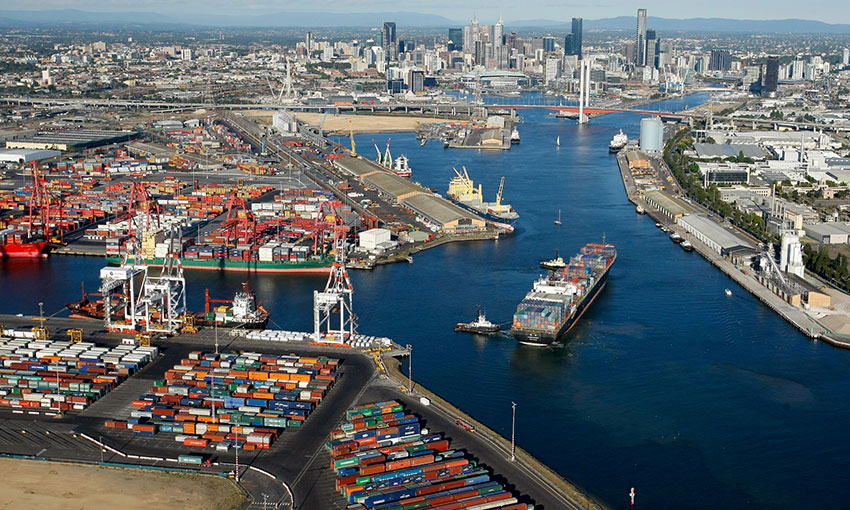SHIPPING Australia has lodged a submission with the Victorian Essential Services Commission (ESC) objecting to a price hike plan by the private operators of the Port of Melbourne.
In its application to the Victorian ESC, the port operators propose upping prices to fund an infrastructure upgrade. The Port of Melbourne would thereby be enabled to handle bigger ships.
Shipping Australia argues that allowing the port to hike prices to fund those infrastructure upgrades is unreasonable.
Firstly, the need for an upgrade was both predictable and actually predicted at the time of privatisation. The cost of this wholly-necessary upgrade should have been factored in at the time of privatisation.
Who should bear the risk?
Secondly, it is a general commercial principle that a business which decides to invest in expansion will itself bear the risk of not recovering its capital and/or not generating a desired return on investment. For example, if an ocean shipping company decides to build a new fleet of ships then the ocean shipping company, its suppliers and its customers would reasonably expect that the ocean shipping company itself would bear the risks of that investment.
Why should the Port of Melbourne be any different? Why should the Port of Melbourne be allowed to insulate itself from free-market risk by getting ocean shipping companies to pay for its infrastructure upgrades?
Thirdly, it is also a general commercial principle that a business which builds and owns assets for the purposes of increasing product sales (in this particular case, increased container throughput), and thereby ultimately increasing revenues and profit for itself, ought to fund its own investments.
After all, when a private ocean shipping company decides to expand its business by placing an order for a fleet of new ships at a shipyard, the ocean shipping company itself pays for that new-build order. It either pays for its new fleet directly from its balance sheet or it borrows money from banks to do so. Similarly, the Port of Melbourne should use its own resources, or borrow money to fund investment in its own assets from which it will benefit through increased throughput, revenues and profits.
Shipping Australia agrees that more cargo and bigger ships are coming and that the port needs to upgrade so as to handle a much bigger trade.
If not, it seems likely that the port will be choked with severe and ongoing congestion in the not-too-distant future.
Private port operator will face strong incentives to upgrade
Whether or not Port of Melbourne chooses to upgrade its assets so that it can handle larger ships is a matter for the private port operators. However, Shipping Australia takes issue with the argument that private port operator (being a monopoly, or near-monopoly, actor) has no incentive to fund an upgrade without being heavily subsidised by the ocean shipping industry.
Firstly, as noted above, a more capable port will ultimately lead to greater revenues and profits.
The biggest benefit to the private operator is perhaps not quite so evident. And it’s this: upgrading now will massively obviate future severe disbenefit that would otherwise inevitably occur.
These disbenefits include:
- the daily pains and frustrations of operating a chronically and severely congested port;
- being subject to fierce criticism from the public, industry and political representatives;
- possible future regulatory or legislative intervention by public officials as a consequence;
- shipping lines taking actions such as skipping port calls to manage the effects of congestion;
- the possible creation of strong competitors located in the Port of Melbourne’s hinterland; and
- a boost to the competitive position of more distant competitor ports that have hinterlands which overlap with the Port of Melbourne.
These disbenefits could potentially lead to a loss of monopoly status and market share at the Port of Melbourne in the future.
In the event that a price hike is authorised
Should the Port of Melbourne be allowed to charge an enhanced fee to pay for the Port of Melbourne’s upgrades, a proposition to which the ocean shipping industry objects, Shipping Australia calls for:
- a prohibition on any price increase, tariff, surcharge or other price increase of any shape, form, or kind being introduced to fund infrastructure until such time as the extra infrastructure is actually ready for use;
- any funding mechanism should take the form of a clearly-labelled, discrete and differentiated surcharge that is invoiced on a line-item basis and is provided together with a statement explaining what the charge is, who introduced it and why it is being charged;
- any price increase, surcharge etc should be specifically and publicly limited in amount, scope and duration. There should be a specific prohibition on that mechanism being rolled over, absorbed into other charges, continued or extended in any shape, form, or in any way whatsoever; and
- any surcharge should be given a specific name, with specific spelling, which cannot in future be changed or amended. There should be a clear and unambiguous explanation in plain English prominently displayed on the Port of Melbourne’s website of what the charge is, how it is calculated and applied, how much it costs and when it will end.
This article was originally published by Shipping Australia.

